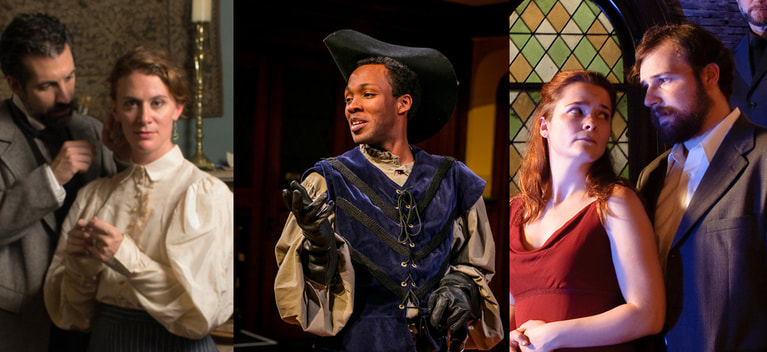Our Mission
|
The Philadelphia Artists’ Collective (PAC) creates vibrant theatrical events that challenge the expectations of classical theatre. This diverse cohort of theatre artists stages rarely produced texts with visceral clarity in intentional spaces. PAC unearths essential stories, expands the classical canon, and inspires audiences to lean in and engage with our shared human experience.
|
Our Core Values
|
Collaboration
We are a collective that embraces our unique, creative abilities and communication styles. We endeavor to create a community of sincerity, supportive care and fun. Respect
We treat every member of our team, including staff, production team, artists, patrons, and theatre community, with respect and courtesy. Passion
We are a small but mighty company, and we do this work because it brings us joy! |
Artistry
Our work is thoughtful, scrappy, and compelling. Our commitment to breathing new life into classical stories is realized through conscious casting, collaborative engagement with diverse arts organizations, and the intentional spaces where we stage productions. Equity, Diversity, Inclusion, and Accessibility
We aspire to develop a more inclusive, diverse, equitable, and accessible theatre community. We aim to create work that reflects the rich community of Philadelphia. |
...But why rare classics?
The classics let us wonder over worlds that seem so foreign; worlds without smartphones and airplanes. But as a species, we haven't really changed. The technology changes, but the humanity stays the same. We still love, dream, regret, and laugh the way we have for thousands of years.
Which is why we believe the classics belong to everyone. They are living, breathing events. They do not belong to scholarship or to museums. They belong to human experience: life, death, love, loss, and gain. We do not go to a Shakespeare play to learn about Shakespeare. We go to learn about ourselves.
And rare classics provide a useful naïveté. We know Romeo and Juliet won't make it through the night. But most of us don't know if Silvia and Harlequin are meant for each other, or if the Duchess of Malfi will see the light of day. We're surprised, challenged, delighted. If classic plays and literature feel like a lot of work, we say: good. Most things worth doing in this life aren't easy. We like a challenge. Especially ones that celebrate beauty, and make the world a better place.
Which is why we believe the classics belong to everyone. They are living, breathing events. They do not belong to scholarship or to museums. They belong to human experience: life, death, love, loss, and gain. We do not go to a Shakespeare play to learn about Shakespeare. We go to learn about ourselves.
And rare classics provide a useful naïveté. We know Romeo and Juliet won't make it through the night. But most of us don't know if Silvia and Harlequin are meant for each other, or if the Duchess of Malfi will see the light of day. We're surprised, challenged, delighted. If classic plays and literature feel like a lot of work, we say: good. Most things worth doing in this life aren't easy. We like a challenge. Especially ones that celebrate beauty, and make the world a better place.



